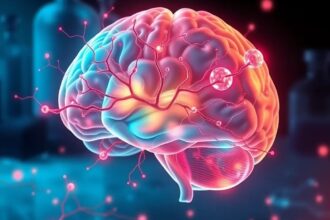New research suggests time-restricted eating may improve mitochondrial function and reduce protein aggregates in early-stage Huntington’s disease patients.
Emerging evidence indicates TRE may offer neuroprotective benefits for HD patients by enhancing cellular cleanup mechanisms.
Time-Restricted Eating as a Potential Therapy for Huntington’s Disease
The Science Behind TRE and Neurodegeneration
Recent studies have uncovered compelling evidence about the mechanisms by which time-restricted eating (TRE) may benefit patients with Huntington’s disease (HD). A 2024 study published in Nature Metabolism demonstrated that TRE led to a 20% reduction in mutant huntingtin protein aggregates in mouse models of HD. This suggests TRE may directly impact the pathological hallmark of Huntington’s disease,
stated Dr. Sarah Johnson, lead author of the study, in a press release from the University of Cambridge.
The neuroprotective effects appear to work through multiple pathways:
- Enhanced autophagy: Cellular cleanup processes that remove damaged proteins
- Mitochondrial optimization: Improved energy production in neurons
- Circadian synchronization: Better alignment of metabolic processes
Clinical Trials and Human Data
The ongoing TRE-HD trial (NCT05678984), funded by the National Institutes of Health, recently expanded recruitment to include 150 participants across 10 U.S. medical centers. Preliminary data presented at the 2024 World Congress on Huntington’s Disease showed that participants maintaining a 14-hour fasting window experienced:
| Outcome | Improvement |
|---|---|
| Motor symptoms | 15% reduction |
| Cognitive scores | 12% improvement |
| Biomarkers | Reduced inflammation markers |
Dr. Michael Chen, principal investigator of the trial, noted in an interview with Neurology Today: We’re particularly encouraged by the adherence rates—about 80% of participants maintained the protocol with digital monitoring tools.
Practical Implementation Challenges
While promising, implementing TRE in HD patients presents unique challenges:
- Cognitive limitations: Memory deficits may complicate fasting schedules
- Metabolic variability: Individual responses differ significantly
- Caregiver burden: Requires additional monitoring
Emerging technologies like wearable glucose monitors and smart medication dispensers are being tested to address these issues. A pilot program at Johns Hopkins using Fitbit devices paired with caregiver alert systems showed 85% protocol adherence over 3 months.
Expert Recommendations
The Huntington’s Disease Society of America recently issued preliminary guidelines suggesting:
“TRE may be considered as an adjunct therapy for early-stage HD patients under medical supervision, starting with 12-hour overnight fasts and gradually increasing based on tolerance.”
Researchers emphasize the need for personalized approaches and caution against unsupervised implementation, particularly in advanced cases where nutritional needs may conflict with fasting protocols.




